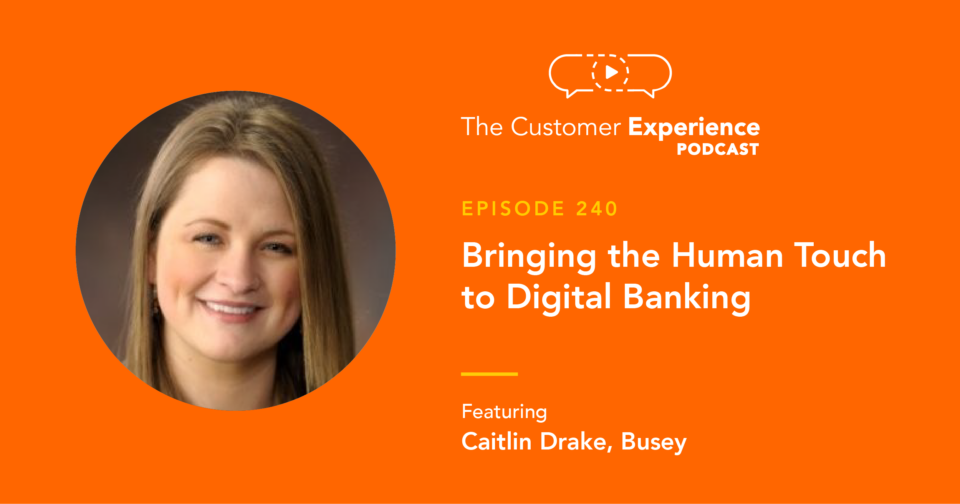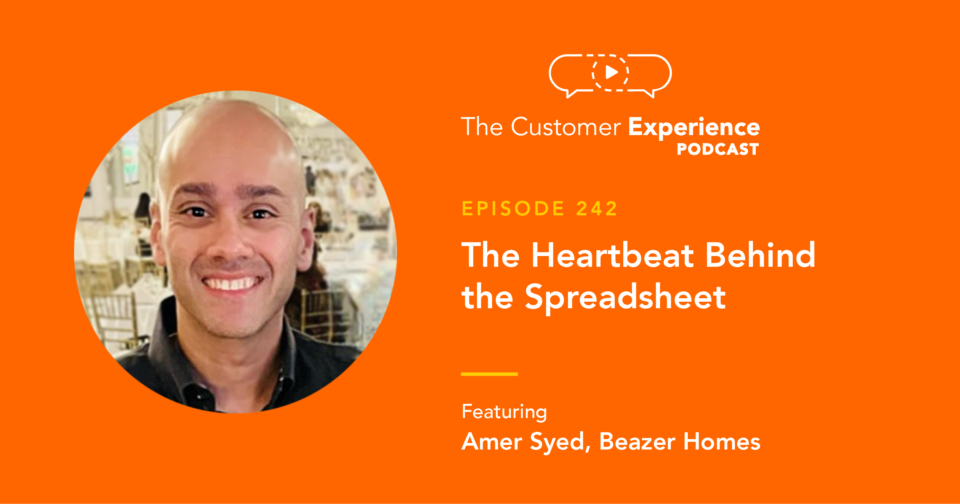
Apple Podcasts | Google Podcasts | Stitcher | Spotify
Much like a free lunch, free use of others’ intellectual property is rare at best and a lawsuit waiting to happen at worst. We live in a world where all known information is available online in a ready-to-use format. Both the creative properties you make and borrow must be used and exchanged in a legal fashion if you want to improve customer experience in the right way.
On this episode of The Customer Experience Podcast, you’ll learn from a guest how marketing teams and others can navigate the world of intellectual property and succeed in their business practices.
Our guest, Sharon Toerek, is one of the few I’ve had the pleasure of meeting in person! She hosts The Innovative Agency Podcast and was kind enough to have me as a guest on Episode 37. She makes sure her customers feel “seen” and “heard,” which is language we use ourselves, but don’t often hear on this show.
As an intellectual property and marketing law attorney, Sharon provides creative professionals with solutions to protect, enforce, and monetize their assets. She also explains why trusting the team you work with allows you to deliver a higher quality customer experience. She’s an incredibly active member of the entrepreneurship and small business community in the Cleveland, Ohio area. She’s a two-time speaker at Inbound, HubSpot’s annual marketing conference. She owns and operates her own legal practice, Legal+Creative.
Off the top of our conversation, Sharon notes that it can be difficult to narrow down such a broad topic as “customer experience.” For her, customer experience that meets her standards is whether or not a client feels they were “heard” and “seen” while working with her, as she explains here …
As a legal client, few people ever get 100% of what they want. But by making sure that you as the service provider were listening and being empathetic toward the client, you’re laying the foundation for a better experience.
Listen to our full conversation embedded below or in your favorite podcast player through the links below – or scroll through this post to learn about subjects like:
- The basics of intellectual property and ways to monetize and protect your creations
- The importance of managing and protecting your customers’ data properly
- The right and wrong ways to engage influencers in support of your brand (yes, the ones you might sigh at online)
- The right and wrong ways to use others’ images, text, and music (spoiler: “fair use” doesn’t mean free use)
- The role of specialization in differentiating your company and customer experience
- Much more!

Influencer marketing. Data privacy. Illegal “borrowing” (i.e. stealing).
It’s all here. Enjoy!
What Your Marketing Team’s Doing That’s Probably Illegal
To listen to any or every episode, subscribe to The Customer Experience Podcast in your favorite podcast player:
> Apple Podcasts
> Google Podcasts
> Spotify
> Stitcher
You can always find the full conversation embedded right here in each episode’s companion blog post.
So, you get the insights and guidance of Sharon Toerek right here …
Intellectual Property and Legal Hotspots
Sharon’s client base primarily consists of entrepreneurs and small businesses who do marketing and creative work for their clients. “Just like any other entrepreneur, they have these specific regulatory or legal issues, and they’re creating a lot of intellectual capital.” This is where her legal advisement comes to their aid as she explains in this video clip …
Before working with her, many clients need advocates to protect them. They need a source of education to guide them in this incredibly complex and dynamic environment. For example, intellectual property has become even more challenging to manage due to the open-access nature of the internet.
Here, Sharon explains two of the biggest legal hotspots she sees right now …
Data Privacy
The European Union’s GDPR was the big one. California‘s the next one. And states like her homestate of Ohio aren’t far behind here. “There’s this growing pressure in any industry that relies upon the ability to do direct marketing to create some sort of national standards so that marketers aren’t dealing with 50 different sets of state laws,” Sharon said. This national standard would provide businesses of all kind the opportunity on their customers than on constantly adapting to local and national law change.
Social Media and Influencer Marketing
“This is an ongoing concern because it impacts every kind of company, whether you do B2B marketing or you’re a B2C company,” Sharon says. Many of the issues around employing micro influencers and celebrity endorsers relate to the disclosures required of ad-based marketing (i.e. influencer receives a product or service in exchange for sharing it with their fanbase).
Influencer Marketing Do’s and Don’ts (It’s Not a Popularity Contest
“The worst example of influencer marketing blowing up is when a celebrity is involved, and there is some sort of financial or physical harm,” Sharon says. A lack of knowledge that leads to a false claim or an overlooked disclaimer can be disastrous for a campaign.
With micro influencers, you’re working with people who’ve built targeted, niche audiences to whom they’ll expose your product or service for financial consideration. Proper disclosure of their involvement with your company or campaign are the most common issues. “It’s the lack of disclosing when it’s appropriate to disclose. It’s making claims and posts about products or services that either isn’t true or they may be true, but overbroad,” Sharon adds in the clip below.
An easy takeaway: Do the right thing (novel, but never overstated). Whether it’s disclosure, understanding, or properly informing an influencer on their role with a brand for their audience, do the right thing (legally speaking).
Marketing teams are increasingly attracted to using micro influencers in advertising campaigns because of their engaged audiences. Their smaller followings (compared to a national or international celebrity) allow them to form deeper connections and higher engagement with people and, therefore, greater impact when marketing a company’s service or product.
“From a legal point of view, these are the campaigns where if you do upfront team education, you can help them understand that these are the rules,” Sharon explained. Because they’re often small businesses themselves, they don’t know all the rules and can’t help with compliance. But your reputation is on the line as much as theirs, so you have to keep it legal. In contrast, of course, expensive lawyers are an inherent part of working with a bigger celebrity.
Once education is done, monitoring becomes a vital role in how micro-influencer campaigns are evaluated. “Because of the viral nature of social media, once things are out there, it matters how quickly you react to dial it back,” Sharon says. One advantage of working with micro-influencers is that their smaller audiences and higher engagement allow them to react faster to audience feedback and your company’s needs.
Micro influencers, then, can provide a customer experience that’s both approachable by individuals and firms alike. Their “tribes,” as Sharon calls them, are dedicated fan bases that often feel seen, heard, and understood by that influencer.

No, That Content Is Not Free to Copy, Paste, and Use
“When it’s for a commercial purpose, there is no such thing as fair use,” Sharon says. No matter the platform. No matter the content type. No matter your purpose.
Take a deep breath and read that again. Share it with your marketing team. With your creative friends in the freelance industry. Anyone start getting the sweats? That’s normal when content theft is defined by a legal advisor.
“Attribution is nice, but it’s not technically going to get you out from under any copyright problems,” she advises. Like a cease and desist notice or a hefty licensing fee. Check out Sharon’s thoughts on “free use” versus fair use in the clip below …
“We’ve got this whole generation of digital natives who haven’t been taught differently that just because something is out there online, it is not free for the taking, particularly when your use is commercial,” she cautions.
In other words: your marketing team may be ignorant of the law and often acting illegally.
Again, fair use almost certainly does not apply to your team’s reuse of text, images, and music. The legal precedents for such are small and usually not applicable to those trying to skate by on them.
Now, after reading all of that, you might find content on the internet and still want to use it. How would you legally go about that? For Sharon’s clients in this scenario, the answer is simple: permission. “If you’re going to repost the content of another person, you need their permission. You just do,” Sharon firmly states. It’s not hard, and more often than not the creator is happy to collaborate or share their work at a reasonable rate.

Sharon also adds how easy it is to hire out content generators to create for you. A catchy Taylor Swift song might be great for your new video, but the cost can make it difficult to justify. Hiring a local artist will save you and provide a great connection back into the local community your company serves.
In the video below, she brings up new freelance business models and provides another valuable cautionary tip …
At BombBomb, we have a team of creative individuals making content for us on the daily. Now and then, they need to outsource an image, an illustration, or a piece of music. By using licenses such as the Adobe Creative Cloud or asking original poster permission to use, it allows them to find great content to legally use. The point is, just like we learned as children, it’s always important to ask for permission before doing something that affects others.
Creating a Better Customer Experience Starts with You
For Yourself:
“One of the bigger mistakes I made earlier on in my business career was confusing responsiveness with reactiveness,” Sharon offers. “We are so hyper-focused on getting back to the customer or the client in a short amount of time that we’re constantly spending our days on putting fires out mode.”
Sound familiar? It does to me! Guilty as charged.
Check out the clip below to learn how she overcome this in order to create and deliver a better experience for her customers …
“Don’t be knee-jerky. Take a second to really see, hear, and understand the customer,” Sharon advises. “Then respond. And in doing so, provide a great customer experience.”
Hear and understand what your customers really need. Set and manage expectations. And be clear about the difference between being responsive and being reactive. Your customers will appreciate it.
From Your Team:
Consistent with the first of our five core values (relationships), I give every guest the chance to thank or mention someone who’s had a positive impact on her or his life or career – and to thank or mention a company that’s delivering great customer experience.
For the latter, I’ve heard Apple, Slack, the Four Seasons, and names of other great companies. But I’d never heard what Sharon offered … her dentist’s office! And she turned it into a powerful lesson about a team-oriented concierge mindset.
Sharon talks about how trusting the team you work with is essential in serving your customers. Customers have so many first points of contact with your company that it’s difficult to manage their initial impression of you. That’s why making sure the whole team is driven toward providing an excellent experience, no matter what department they’re in, will maintain consistency throughout their life cycle.
“Customer experience starts based upon the way your team is cultured to interact with them,” Sharon adds. “You’ve got to trust that you’ve got somebody at the gate who is going to make them feel seen and heard as well.”
And the concierge? That’s someone who’s always there for a customer and ready to guide them.
Learn more in this final video clip …
This post is based on a conversation with Sharon Toerek of Legal+Creative. Check out another conversation between us on episode 37 of her podcast, The Innovative Agency Podcast, by clicking right here or look for episode 37 right here!
Want more from The Customer Experience Podcast?
Subscribe right now in Apple Podcasts, in Google Podcasts, in Spotify, or in Stitcher. While you’re there, please leave a rating (or even a review!).
Why subscribe?
For past episodes like these:
> “No, Your Customer Isn’t Always Right” with Jaime Casap (Google)
> “Trust, Neuroscience, and The Customer Experience” with Ed Powers (InteliSecure)
> “Connecting with Customers by Exploring a Shared Belief” with Steve Pacinelli (BombBomb)
And for upcoming guests like these:
> Customer experience expert Dan Gingiss
> Co-author of The Customer Centricity Playbook Sarah Toms
> General Manager of HubSpot’s new Service Hub Mike Redbord
The Best Way for Customers to Feel Seen and Heard
If you see things like Sharon and I do, you know how important it is for your customers and future customers to feel seen, heard, and understood.
Instead of relying exclusively on the same black text on the same white screen, which doesn’t build trust, differentiate you, or provide as much clarity as if you just looked her or him in the eye and talked, send simple, personal videos.
It’s fast, easy, and effective – if you know how to do it.
Good news! We literally wrote the book on it – and it’s an Amazon #1 bestseller in Business Sales, Business Communication, and Customer Relations, the Porchlight Books #1 bestseller in its opening month of release, and a Barnes & Noble besteseller in its opening week of release.






